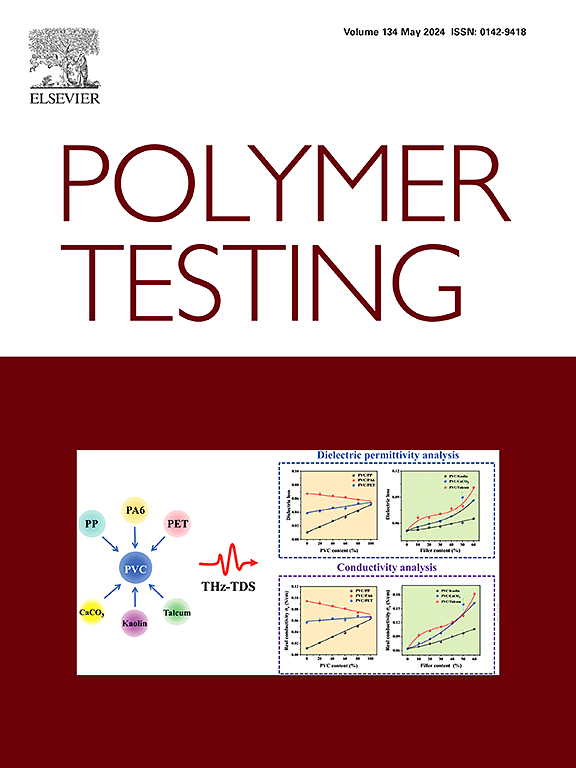Construction of all-polyimide fiber based paper with high breakdown strength and stable properties for advanced insulation
IF 5
2区 材料科学
Q1 MATERIALS SCIENCE, CHARACTERIZATION & TESTING
引用次数: 0
Abstract
All-polyimide (PI) fiber based composite paper integrate the excellent insulation properties and heat resistance with lightweight and highly designable characteristics, making them ideal for insulation in ultra-high voltage transmission and new power systems. The key to fabricate all PI fiber based composite paper lies in the interface combination inside the composites, which strongly depended on the adhesive components. In this study, PI structures with trifluoromethyl and amide units were synthesized and its precipitated fibers with microfibrillated morphologies were prepared, which could fully utilize the hydrogen bonding and physical bunding to combine with commercial PI chopped fibers, thus enhancing the comprehensive performance of all PI fiber based composite paper. By optimizing the preparation process, the mechanical strength of the obtained PI paper could reach 11 MPa with a breakdown strength of up to 41.7 kV/mm, meeting the requirements of H-level or above insulation paper. Additionally, as-prepared PI paper demonstrated stable dielectric properties and integrated structures under complex working circumstances, such as wide temperature ranges, hydrothermal environments, acidic and oil immersion conditions, providing strong assurance for the safe and stable operation of ultra-high voltage transmission power systems in the future.

全聚酰亚胺纤维基纸的结构,具有高击穿强度和稳定的性能,用于高级绝缘
全聚酰亚胺(PI)纤维复合纸将优异的绝缘性能和耐热性与轻质和高度可设计的特性相结合,使其成为超高压输电和新型电力系统绝缘的理想选择。制备全PI纤维基复合纸的关键在于复合材料内部的界面结合,而这种结合很大程度上取决于粘合成分。本研究合成了具有三氟甲基和酰胺单元的PI结构,并制备了微纤化形态的PI沉淀纤维,可以充分利用氢键和物理键与商用PI短切纤维结合,从而提高了全PI纤维基复合纸的综合性能。通过优化制备工艺,得到的PI纸机械强度可达11 MPa,击穿强度可达41.7 kV/mm,满足h级及以上绝缘纸的要求。此外,制备的PI纸在宽温度范围、水热环境、酸性和油浸等复杂工作环境下均表现出稳定的介电性能和完整的结构,为未来超高压输电系统的安全稳定运行提供了有力保证。
本文章由计算机程序翻译,如有差异,请以英文原文为准。
求助全文
约1分钟内获得全文
求助全文
来源期刊

Polymer Testing
工程技术-材料科学:表征与测试
CiteScore
10.70
自引率
5.90%
发文量
328
审稿时长
44 days
期刊介绍:
Polymer Testing focuses on the testing, analysis and characterization of polymer materials, including both synthetic and natural or biobased polymers. Novel testing methods and the testing of novel polymeric materials in bulk, solution and dispersion is covered. In addition, we welcome the submission of the testing of polymeric materials for a wide range of applications and industrial products as well as nanoscale characterization.
The scope includes but is not limited to the following main topics:
Novel testing methods and Chemical analysis
• mechanical, thermal, electrical, chemical, imaging, spectroscopy, scattering and rheology
Physical properties and behaviour of novel polymer systems
• nanoscale properties, morphology, transport properties
Degradation and recycling of polymeric materials when combined with novel testing or characterization methods
• degradation, biodegradation, ageing and fire retardancy
Modelling and Simulation work will be only considered when it is linked to new or previously published experimental results.
 求助内容:
求助内容: 应助结果提醒方式:
应助结果提醒方式:


